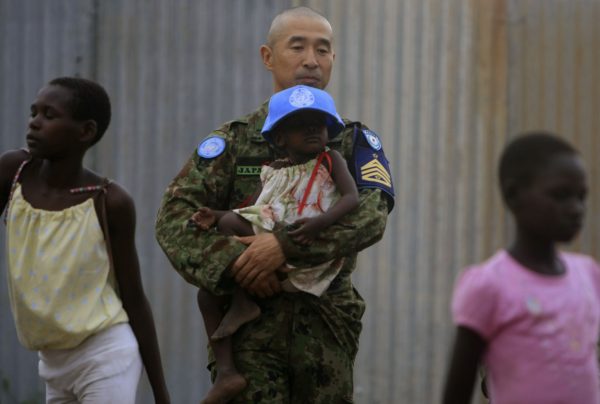Under Kaketsuke Keigo, the SDF’s mandate is to protect Japanese nationals, foreign aid workers and peacekeepers under threat. It was added to the security legislation passed by the Diet in September 2015 legalising Japan’s proactive contribution to peace. The South Sudan mission was the first mission the SDF undertook under the new laws.
So why was the mission terminated so soon?
The Japanese government’s official explanation for the withdrawal was that the SDF in South Sudan since November 2011 had already made a significant contribution to road infrastructure construction. But a series of international media reports indicated that the real reason may be the deteriorating security condition in South Sudan.
The United Nations also regarded the security situation as putting UN peacekeepers and aid agencies under threat. In August 2016, the United Nations Security Council mandated an additional 4,000 troops to protect the people of South Sudan from the conflict. The Special Advisor to the United Nations for the Prevention of Genocide Adama Dieng reported in November 2016 that South Sudan had ‘the potential for genocide’. But this was scarcely reported in Japan. Contrary to these negative assessments, the Japanese government still maintained its optimistic view of the security situation in the South Sudanese capital Juba, where SDF forces were stationed.
The Japanese government’s denial of the insecurity in South Sudan can be attributed to the dilemma it faced over the new security bill and the new ‘proactive contribution to peace’ principle it has been promoting. While Japan wants to contribute to UN peacekeeping operations (UNPKO) and adopt a more active security role in the Japan–US alliance, persistent pacifism has acted as a major constraint on its activities. The Japanese government remains overly cautious about the SDF’s participation in UNPKOs and sensitive to any situation that could result in Japanese fatalities that might derail its broader security agenda.
The Japanese government was also likely concerned that the deployment of the SDF under Kaketsuke Keigo amid the worsening security conditions in South Sudan could go beyond the legal parameters of SDF participation in UNPKOs. In February 2017, Japanese Defence Minister Tomomi Inada described the situation in South Sudan as an armed clash, instead of a battle/fighting. This description meant SDF participation in the UNPKO remained legal under the rules of engagement of Japanese peacekeeping operations and the Japanese Constitution, which prohibits Japanese forces from engaging in fighting.
Japanese media suspected a cover up due to the secretive handling of the issue by the Ministry of Defence. The Ministry at first said that the SDF’s July daily reports on South Sudan — which contained descriptions of the local fighting — did not exist, but later it admitted their existence.
The Japanese government’s dilemma should be resolved through straightforward explanations about the risk and safety of SDF peacekeeping operations in South Sudan and elsewhere. In this way, it should clarify the limitations and possibilities of the proactive contribution to peace it has proclaimed.
It is important for the Japanese government to earn the trust of the public in relation to SDF deployments. Failure to do so could seriously damage its plans under the new security law. Any cover ups would be counterproductive.
Naoko Kumagai is an Associate Professor at International University Japan.

